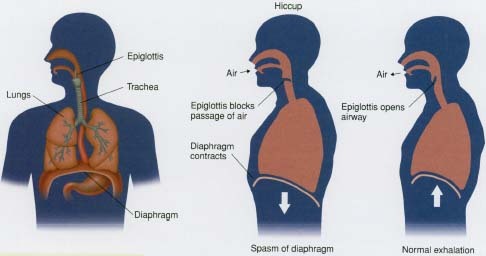Hiccups

Hiccups occur when the diaphragm * suddenly contracts during breathing. The vocal cords quickly close, and an odd sound comes from the throat. Hiccups are involuntary. Their cause is not known, and hiccups do not seem to serve any useful purpose.
KEYWORDS
for searching the internet and other reference sources
Pulmonary system
Respiratory system
Singultus
Are Hiccups Dangerous?
Most hiccups are not harmful. The frequency of most hiccups is usually from 4 to 60 hiccups a minute. Hiccups usually occur in people (even

What Are the Different Types of Hiccups?
Hiccups are classified into several categories. A "hiccup bout" can last from several seconds to several days. A "persistent hiccup" is one that lasts for several days or weeks. Hiccups lasting more than a month are called "intractable." In rare cases, intractable hiccups may continue for years.
* diaphragm (DY-a-fram) is the muscle that separates the chest and abdominal cavities. It is the chief muscle used in breathing.
What Is Your Home Cure
for Hiccups?
Everyone seems to have a special way to stop hiccups even though none of these remedies has been proved to work consistently. Here are some of the most common home cures:
- Holding one's breath and then exhaling very slowly
- Holding the nose
- Breathing into a paper bag
- Sucking on ice cubes
- Sucking on hard candy
- Drinking water from the far side of a glass
- Gargling
- Pulling on the tongue
- Biting on a lemon
- Swallowing granulated sugar
- Swallowing hard crusts of bread
- Sneezing
- Peeling onions
- Bending over so that the head is lower than the chest
- Surprising or frightening the person with hiccups
- Slapping the person with hiccups on the back
What Is the Treatment for Hiccups?
Everyone seems to have a favorite cure for hiccups, but usually they just go away by themselves. In severe cases of hiccups, doctors may try to block the hiccup process (also called the "hiccup arc" or "pathway") by stimulating parts of the respiratory (breathing) system or by prescribing medications to relax the muscles involved. When all else fails, surgery is done to block the nerve signals from the phrenic (FREN-ik) nerve to the diaphragm. The purpose of this procedure is to paralyze part of the diaphragm.
There is a medical term for when a person has just one very loud hiccup. Are you able to tell me what it is? I heard it once, but can not recall the term.
Thanks